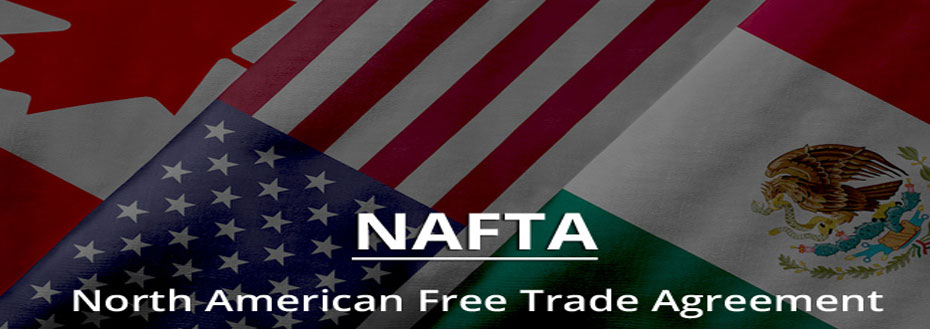The victory of President Donald Trump in the U.S. Elections was a landmark moment, not only in the way the whole Republican election campaign was undertaken but also the way it signified a dramatic shift in U.S Foreign Policy. Trump's victory was built on the promise of fighting for the common man in America, keeping jobs in the country while giving more opportunity to the impoverished.
Keeping to his promise, Donald Trump vowed to renegotiate NAFTA (North American Free Trade Agreement) on the day of his swearing-in ceremony with Mexico, pledging to bring massive changes to the existing trade deals in place. He described the North American trade agreement as "the worst trade deal in history", blaming it solely for the poor state of U.S. manufacturing industries.
The White House soon also released an official statement speaking clearly about its will to renegotiate NAFTA with Mexico, expressly stating that if their partners denied a renegotiation, then the U.S. would withdraw from the trade deal. While NAFTA renegotiation could severely impact many areas of business, in this article we will focus on its effect on small businesses.
What is NAFTA?
The North American Free Trade Agreement is a trade pact between three geographically close countries, including the USA, Canada, and Mexico. The framework of this deal was initially drafted under ex-US President Ronald Reagan back in 1987 and was finally signed and brought into operation under Bill Clinton in the year 1994.
As a free trade agreement, NAFTA has greatly boosted business within these 3 countries, eliminating costly trade tariffs while allowing supplies and materials to flow freely across borders. Today, NAFTA is the world's largest free trade agreement and more than $1.4 billion worth of goods daily cross the US-Mexico border seamlessly owing to this deal. NAFTA also makes it easier for manufacturers and companies to move operations from one country to another. Under its current state, NAFTA encompasses the following -
- Goods which are either produced or obtained in either of the three NAFTA regions or are transformed in them
- Goods which are completely produced within one of the three countries, exclusive of their originating materials
- Some offshore goods are generally considered NAFTA-eligible, as long as they undergo processing in one of three North American countries
NAFTA Renegotiation by Trump - The Basics
One of the major reasons for the discord and why President Trump wants to renegotiate NAFTA lies in the fact that he believes thousands of US jobs have been lost due to this trade agreement, which is true to a limited extent. This is because for every job lost, there are many other US-based jobs which are reliant on NAFTA as it exists currently. This figure stands at about 6 million as of now.
According to most major decision-makers and analyst figures, the US has lost more jobs to automation and computerization than to NAFTA. At the same time, it cannot be denied that many companies have moved to Mexico over the years to cut their production costs, including Ford and GM. At the same time, both these companies still employ more Americans than Mexicans. Add to this the fact that the US also exports a large amount of materials to Mexico, to the tune of about 430 million US dollars, and you can understand why many policy-makers and business owners are apprehensive about the effect of Trump's renegotiation efforts.
NAFTA Renegotiation and Small Business - What the Future Holds
The NAFTA definition incorporates "free-trade" as one of its strongest tenets. Therefore, ending NAFTA as it is in the current form can have a big impact on the way small businesses function currently. Also, it is highly probable that if Mexico loses its free trade rights, then US business might just move to the next cheapest option in Latin America or some other Asian country. Some of the effects that small business owners might see soon include -
-
Certain Commodities Might Become Expensive
Killing NAFTA would most likely cost quite a few jobs in industries which largely depend upon its free trade policies to make their profits. For example, many small denim manufacturers depend on NAFTA to ship their raw materials to Mexico, where it is then cut and processed into jeans. These jeans are then imported back and then sold in the US. According to these manufacturers, tearing up NAFTA will make the prices of jeans shoot through the roof by making manufacturing more costly in the current scheme of things.
-
New Trade Barriers Might Crop Up
Many small businesses over the years have taken advantage of the free trade zone to manufacture products at cost-effective prices. This includes sourcing materials from one country while manufacturing in another, while maintaining job security in both the countries. Such manufacturers are worried that renegotiating NAFTA might spark a lot of new tariff barriers with the other NAFTA countries. This in turn would result in a lot of businesses having to completely overhaul their existing business models.
-
NAFTA Could Potentially Lead to Better Sales and Jobs
Not all is gloomy in the horizon though, as many experts believe that NAFTA could certainly bring back some jobs back to the US. Following the ratification of NAFTA, many US companies saw customer seeking cheaper consumables and goods, leading to jobs shifting from USA to Mexico. Trump's plan to renegotiate the NAFTA could lead to a resurgence of manufacturing in the US as more small business owners produce cheaper alternatives within the country itself. This in turn would greatly benefit the middle-class workers by allowing them more job opportunities than ever before.
-
Better Bilateral Deals Might Help the USA
Most US-based small businesses have their biggest market shares either in the USA or in one of the other two NAFTA countries. For such businesses, while NAFTA might bring in massive unwanted changes, there is a silver lining in the horizon in the form of more bargaining power. By going one on one with weaker economies, businesses in the US will be able to negotiate better bilateral deals, which in turn would lead to better profits. Also, NAFTA renegotiations might open new export opportunities for businesses who had never looked at exporting before, thereby setting up a better platform for new businesses.
-
Global Repercussions are Possible
One major factor which is not being discussed enough is how the North American free trade agreement's renegotiations might affect future ties with other, non-NAFTA countries. Many business owners are worried that new rules in place could spark all-out trade wars with China, resulting in high tariffs and decreasing user base. Many experts believe that if given a shorter end of the stick, Mexico might sign new trade deals with China while giving NAFTA a pass, a decision which could land China-driven business right in USA's own backyard. Furthermore, such global repercussions would also lead to a less competitive marketplace, allowing many businesses to create hegemonies while absorbing smaller businesses.
Confidently Outsource with Flatworld Solutions
At FWS, we have worked diligently over the past 22 years to cultivate strong business relationships with our global and US-based business clients. We believe in supplementing their existing roles with high-quality bespoke logistics services to take care of their express needs.
Contact us right away to know more about our service offerings, and how they can help you streamline existing processes and generate better business revenue.
Contact UsAvail best-in-class services at affordable rates

USA
Flatworld Solutions
116 Village Blvd, Suite 200, Princeton, NJ 08540
PHILIPPINES
Aeon Towers, J.P. Laurel Avenue, Bajada, Davao 8000
KSS Building, Buhangin Road Cor Olive Street, Davao City 8000


